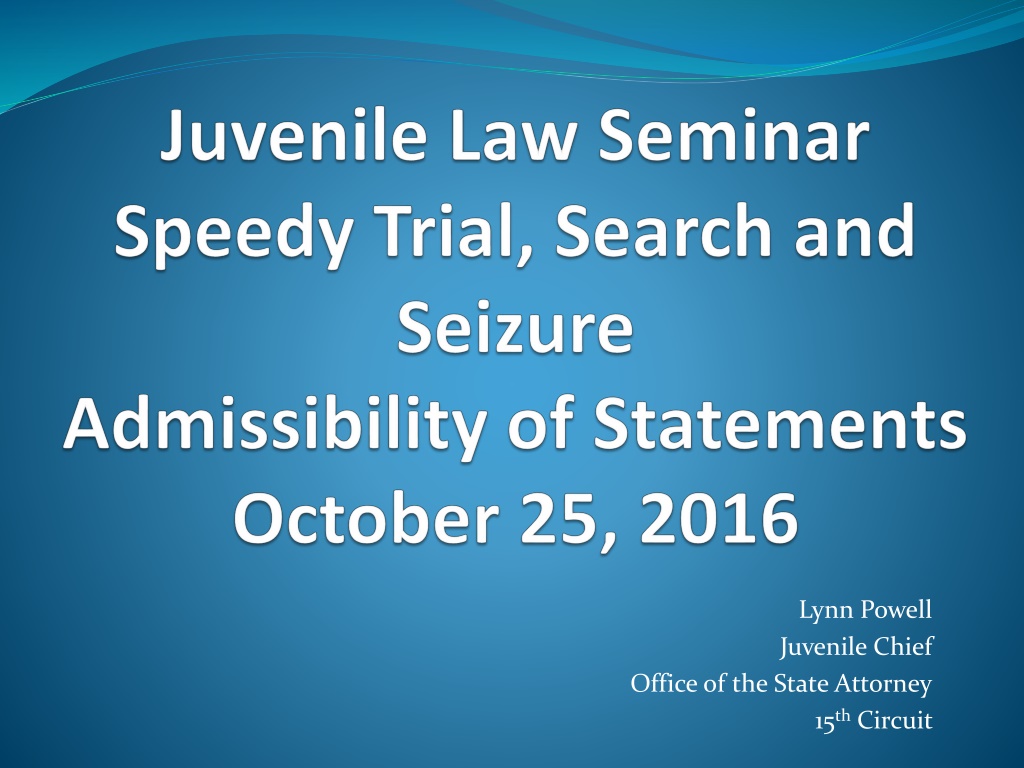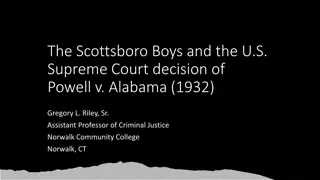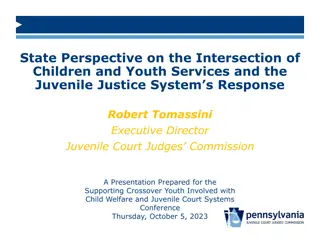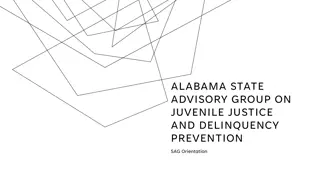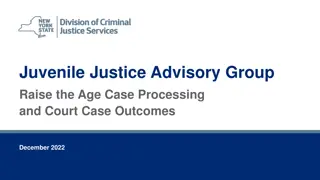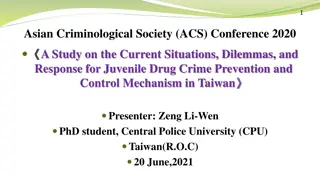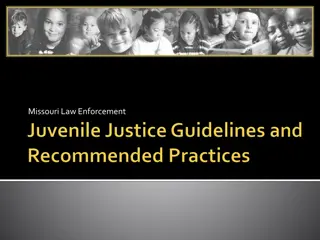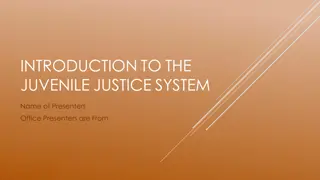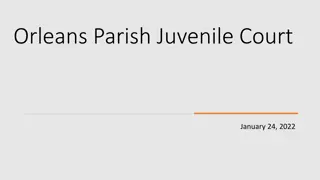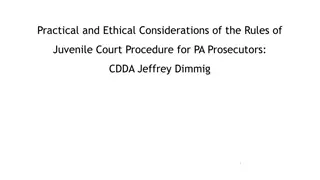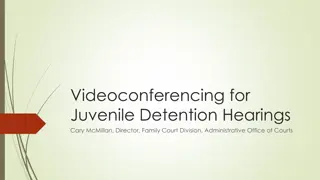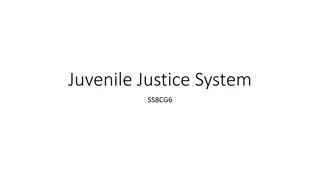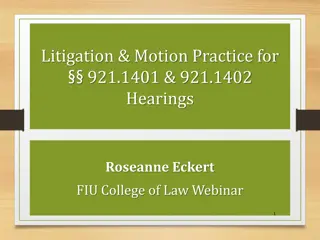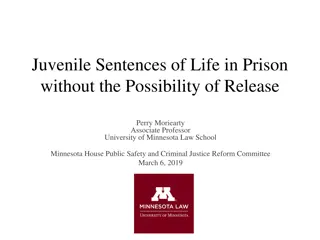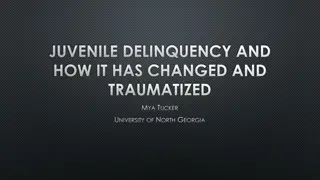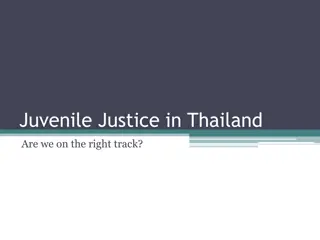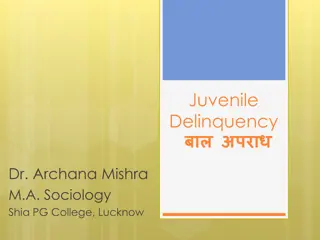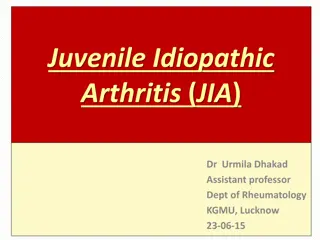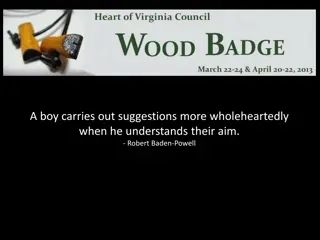Understanding Speedy Trial Rights in Juvenile Cases
Speedy trial rights in juvenile cases are crucial for ensuring timely resolution of legal proceedings. According to Florida laws, the speedy trial time period is 90 days from the date the child was taken into custody or served with a summons. Failure to commence the adjudicatory hearing within this period may lead to the child filing a motion for discharge. Several exceptions exist where the right to speedy trial may be waived or extended. It is essential for all parties involved to be aware of these rules to uphold the juvenile's rights under the law.
Download Presentation

Please find below an Image/Link to download the presentation.
The content on the website is provided AS IS for your information and personal use only. It may not be sold, licensed, or shared on other websites without obtaining consent from the author. Download presentation by click this link. If you encounter any issues during the download, it is possible that the publisher has removed the file from their server.
E N D
Presentation Transcript
Lynn Powell Juvenile Chief Office of the State Attorney 15thCircuit
SPEEDY TRIAL COMPUTATION 8.090(a) Speedy Trial is 90 days from date the child was taken into custody or service of summons, whichever comes first, regardless of whether charge is a misdemeanor or felony. Taking into custody is defined in F.S. 985.03(48) as the status of a child immediately when temporary physical control over the child is attained by a person authorized by law, pending the child's release, detention, placement, or other disposition as authorized by law.
SPEEDY TRIAL FILING OF CHARGES State cannot file a petition after the 90 days speedy trial time period. T.W. v. State, 679 So.2d 69 (Fla. 4th DCA 1996)
SPEEDY TRIAL COMMENCEMENT 8.090(c) A child shall be deemed to have been brought to trial if the adjudicatory hearing begins before the court within the 90 days. Trial only needs to be started within the speedy period. State v. E.B., 540 So.2d 255 (Fla. 4thDCA 1989)
SPEEDY TRIAL MOTION TO DISMISS 8.090(d)(m) If the adjudicatory hearing is not started within the 90 days, the child may file a motion for discharge. If a motion is filed then the child shall simultaneously file a notice of hearing and shall serve the motion and notice upon the prosecuting attorney. Rule 8.090 (b) and (m)(2) The court shall set a hearing on the motion for discharge no later than 5 days from the filing of the motion. Rule 8.090(m)(3) No remedy shall be granted to any child until the court has made the required inquiry under subdivision (d). Rule 8.090(m)(1)
SPEEDY TRIAL MOTION TO DISMISS (cont d) Rule 8.090(d) says the child shall be entitled to the appropriate remedy as set forth in subdivision (m) unless any of the following situations exist: (1) Child has voluntarily waived the right to speedy trial. (2) An extension of time has been ordered under subdivision (f). (3) The failure to hold an adjudicatory hearing is attributable to the child, a co-respondent in the same adjudicatory hearing, or their counsel. State v. M.J., 929 So.2d 700 (Fla. 3d DCA 2006)
SPEEDY TRIAL MOTION TO DISMISS (cont d) (4) The child was unavailable for the adjudicatory hearing. A child is unavailable if: (A) the child or child's counsel fails to attend a proceeding when their presence is required; or (B) the child or child's counsel is not ready for the adjudicatory hearing on the date it is scheduled. No presumption of nonavailability attaches, but if the state objects to dismissal and presents any evidence tending to show nonavailability, the child must, by competent proof, establish availability during the term.
SPEEDY TRIAL MOTION TO DISMISS (cont d) (5) The demand referred to in subdivision (g) is invalid. (6) If the court finds dismissal is not appropriate, the pending motion to dismiss shall be denied, and an adjudicatory hearing shall commence within 90 days of a written or recorded order of denial.
SPEEDY TRIAL MOTION TO DISMISS (cont d) The time period for the 5 day hearing and 10 day for trial are two independent periods of time and shall not be calculated as one 15 day period. State v. S.A., 13 So.3d 506 (Fla. 2014) and State v. J.C., 154 So.3d 496 (Fla. 4th DCA 2015) If the child is not brought to trial within the 10 days, through no fault of the child, then the child shall be forever discharged from the crime. Rule 8.090(m)(3) If the court does not find that one of the enumerated reasons under 8.090(d) exist then it shall order that the child be brought to trial within 10 days. Rule 8.090(m)(3)
SPEEDY TRIAL MOTION TO DISMISS (cont d) A child is not entitled to discharge just because the State does not hold an adjudicatory hearing within speedy trial. A motion for discharge must be filed. There is no automatic discharge. State v. Brehm, 48 So.3d 120 (Fla. 1stDCA 2010); State v. Nelson, 26 So.3d 570 (Fla. 2010) If the child does not file a motion for discharge after the expiration of speedy trial and is then granted a continuance before filing the motion, the child has waived his/her speedy trial right. Id.
SPEEDY TRIAL MOTION TO DISMISS (cont d) A child may waive his/her right to speedy trial by: Written or verbal waiver. But see, State v. Moss, 395 So.2d 561 (Fla. 5thDCA 1981)(a demand for speedy may be filed once speedy is waived) Continuance of a hearing chargeable to the defense. State v. Burgess, 153 So.3d 286 (Fla. 2d DCA 2014). But see, State v. T.G., 990 So.2d 1183 (Fla. 3d DCA 2008) (late discovery continuance did not waive speedy) Failure of child to appear for a hearing after proper notice. Waiver of speedy trial by FTA in juvenile court applies to all charges from that criminal episode including subsequently filed adult charges. Dempsey v. State, 82 So.3d 928 (Fla. 4thDCA 2011) Defense agreement to trial being set outside of speedy. F.A.T. v. State, 522 So.2d 462 (Fla. 3rdDCA 1988); Pannier v. State, 582 So.2d 1240, (Fla. 3d DCA 1991)
SPEEDY TRIAL MOTION TO DISMISS (cont d) If the court denies the motion for discharge on speedy trial grounds, the defense may file a writ of prohibition in the appellate court to prevent further proceedings. Sherrod v. Franza, 427 So.2d 161 (Fla. 1983); Smart v. State, 179 So.3d 477 (Fla. 4thDCA 2015) If the appellate court denies the writ, speedy is waived because the delay in proceeding to trial during the recapture window is attributable to the child. K.C. v. State, 877 So.2d 949 (Fla. 4thDCA 2004) State may file an interlocutory appeal Fla.R.App.P. 9.145(c).
SPEEDY TRIAL INCOMPETENCY 8.090(e) Upon the filing of a motion to declare the child incompetent, the speedy trial period shall be tolled until a subsequent finding of the court that the child is competent to proceed. A.G. v. State, 895 So.2d 473 (Fla. 4thDCA 2005)
SPEEDY TRIAL EXTENSION OF TIME 8.090(f) Provides speedy may be extended by: Written or oral stipulation Written or recorded order of the court for a period of reasonable and necessary delay resulting from proceedings, including but not limited to: Exam and hearing to determine mental competency, or Physical ability of child to stand trial for hearings or pretrial motions Appeals by the state Adjudicatory hearings of other pending charges against the child
SPEEDY TRIAL EXTENSION OF TIME 8.090(f) Written or oral order of court upon motion of court or either party in exceptional circumstances. The order must recite reasons and length of extension. Exceptional circumstances require an extension as a matter of substantial justice to the child, state or both, such as: Unexpected illness or incapacity or unforeseeable and unavoidable absence of a person whose presence/testimony is uniquely necessary for a full and adequate trial Showing by state that: 1) case is so unusual and so complex that it is unreasonable to expect adequate investigation or preparation within periods of time established by this rule; 2) specific evidence or testimony not available despite diligent efforts to secure it, but will be available at a later time; 3) the child has caused major delay or disruption of case, such as preventing attendance of witnesses or otherwise
SPEEDY TRIAL EXTENSION OF TIME 8.090(f) Showing by child or state of necessity: 1) for delay grounded on unanticipated developments which will materially affect the trial; 2) to accommodate co-respondent. A motion for the extension of time must be filed prior to the expiration of speedy trial. State v. J.G., 807 So.2d 748 (Fla. 4thDCA 2002); State v. S.A., 13 So.3d 506 (Fla. 2014)
SPEEDY TRIAL EXTENSION OF TIME 8.090(f) An order granting an extension of time must cite the reasons for the extension and the period of time for which the extension is granted. T.C. v. State, 540 So.2d 937 (Fla. 2d DCA 1989) Exceptional circumstance will not include congestion of court s docket, lack of diligent prep or failure to obtain witnesses, or other avoidable or foreseeable delays.
SPEEDY TRIAL UPON DEMAND RULE 8.090(g) The child shall have the right to demand a trial within 60 days of being charged by filing a written pleading entitled Demand for Speedy Trial and serving it upon the state. P.G. v. State, 711 So.2d 188 (Fla. 5thDCA 1998) (90 day speedy applies if no demand filed within 6o days) The court shall set the matter for report no later than 5 days from the filing, with notice to all parties, for the express purpose of announcing in open court the receipt of the demand and setting the case for trial no less than 5 nor more the 45 days out. Failure of the court to hold the report date does not interrupt the running of any time periods.
SPEEDY TRIAL EFFECT OF DEMAND 8.090(h) A demand for speedy trial shall be deemed a pleading by the child that they are available for the adjudicatory hearing, have diligently investigated the case, and are prepared or will be prepared for the adjudicatory hearing within 5 days. A demand may not be withdrawn by the child except on order of the court, with consent of the state, or on good cause shown. Good cause for continuance or delay on behalf of the child shall not thereafter include nonreadiness for the adjudicatory hearing, except as to matters which may arise after the demand for the adjudicatory hearing is filed and which could not reasonably have been anticipated by the accused or defense counsel.
SPEEDY TRIAL DISMISSAL AFTER DEMAND 8.090(i) If the trial has not commenced within 50 days of the filing of the demand, upon motion timely filed with the court and served upon the state, the child is entitled to remedy under subdivision (m), provided the court has made the required inquiry under subdivision (d).
SPEEDY TRIAL MISTRIAL, APPEAL, NEW TRIAL 8.090(j) A child who is to be tried again or whose adjudicatory hearing has been delayed by an appeal by the state or child shall be brought to trial within 90 days from the date of declaration of a mistrial, the date of an order by the trial court granting a new trial, or the date of receipt by the trial court of a mandate, order, or notice from an appellate or other reviewing court which makes possible a new trial for the child, whichever is last. If the child is not brought to trial within the prescribed time periods, the child shall be entitled to the appropriate remedy as set forth in subdivision (m).
SPEEDY TRIAL DISCHARGE 8.090(k) Discharge from a delinquent act or violation of law under this rule shall operate to bar prosecution of the delinquent act or violation of law charged and all other offenses on which an adjudicatory hearing has not begun or adjudication obtained or withheld and that were, or might have been, charged as a lesser degree or lesser included offense.
SPEEDY TRIAL NOLLE PROSEQUI 8.090(l) The intent and effect of this rule shall not be avoided by the state entering a nolle prosequi to a delinquent act or violation of law charged and prosecuting a new delinquent act or violation of law grounded on the same conduct or episode or otherwise by prosecuting new and different charges based on the same delinquent conduct or episode, whether or not the pending charge is suspended, continued, or the subject of the entry of a nolle prosequi. P.G. v. State, 711 So.2d 188 (Fla. 5thDCA 1998); State v. J.G., 740 So.2d 84 (Fla. 3d DCA 1999); P.S. v. State, 658 So.2d 92 (Fla. 1995)
SEARCH AND SEIZURE MOTION TO SUPPRESS 8.085 Any confession or admission obtained illegally or any evidence obtained by unlawful search and seizure may be suppressed on motion by the child. Motions shall be in writing and signed by the party making the motion and the party's attorney. Court may waive for good cause. Shall clearly state the particular evidence sought to be suppressed, the reason for the suppression, and a general statement of the facts. Before hearing evidence, the court shall determine if the motion is legally sufficient. If not, then it is denied. The moving party shall present evidence in support thereof and the state may offer rebuttal evidence. If the MTS is denied before trial the defense should raise the issue again during trial.
SEARCH AND SEIZURE MTS TIME FOR FILING 8.085(a)(5) Any motion to suppress . . . shall be made prior to the date of the adjudicatory hearing unless an opportunity to make such motion previously did not exist or the party making the motion was not aware of the grounds for the motion. MTS should be made prior to trial. C.M. v. State, 51 So.3d 540 (Fla. 5thDCA 2010) Trial court has discretion to hear MTS made during trial. Savoie v. State, 422 So.2d 308 (Fla. 1982) In exercising its discretion, the court must balance the rights to due process and effective assistance of counsel against the right of the state to be able to appeal an adverse ruling on the MTS. State v. Gaines, 770 So.2d 1221 (Fla. 2000)
SEARCH AND SEIZURE MTS TIME FOR FILING 8.085(a)(5) MTS made during trial after virtually all testimony in state s case, giving state no prior notice of challenge, was untimely and court properly denied. C.E. v. State, 555 So.2d 898 (Fla. 3d DCA 1990) Trial court abused discretion in refusing to hear MTS during trial when child not aware of grounds before hearing. B.M. v. State, 915 So.2d 649 (Fla.2d DCA 2005) Even if child specifically waives right to file pretrial MTS, the court still has the discretion to consider the constitutional challenges when raised by objection at trial. J.L.A. v. State, 707 So.2d 380 (Fla. 5thDCA 1998)
SEARCH AND SEIZURE PREP FOR SUPPRESSION HEARING Defense should meet with the child as soon as possible so information will be fresher in their minds, including facts, possible witnesses, alibis Is the motion legally sufficient? Does it clearly state the particular evidence to be suppressed? Does it state the reason for the suppression? Does it contain a general statement of the facts on which the motion is based? Is there standing to contest the search? A child has no standing to object to the search unless he can prove that he had a reasonable expectation of privacy. The state must make an issue of standing or it is waived. The child has the burden of proving standing. The child must produce evidence.
SEARCH AND SEIZURE PREP FOR SUPPRESSION HEARING Burdens of Proof Defense Burdens of Proof Standing If the State challenges standing, the defense must satisfy the burden by presenting evidence before the State need go forward. Jones v. State, 648 So.2d. 669 (Fla. 1994), cert. denied 115 S.Ct. 2588 (1995). No Warrant The defense may meet this burden by requesting the court to take judicial notice that there is no warrant in the court file. Warrant Invalid The defense must specifically allege that the statements in the search warrant are false. State Burdens of Proof Warrantless Search Consent Search
SEARCH AND SEIZURE 4THAMENDMENT The 4thAmendment of the U.S. Constitution guarantees every person, including juveniles, the right to be free of unreasonable search and seizures. When reviewing a case ask: Does the child have a 4thAmendment right under these facts? Was there law enforcement action or action at the behest of law enforcement? Was there a reasonable expectation of privacy? Was there a warrant or an exception to the warrant requirement?
SEARCH AND SEIZURE 4THAMENDMENT CONSENT A child may consent to be searched, thereby waiving his/her 4thAmendment right. J.W.P v. State, 311 So.2d 116 (Fla. 1stDCA 1975) Child s consent must be: Voluntary and not acquiescing to apparent authority of police. Do you mind if I search you? tends to establish no consent. V.H. v. State, 903 So.2d 321 (Fla. 2d DCA 2005); J.W.E. v. State, 58 So.3d 376 (Fla. 2d DCA 2011) Unequivocally established. V.H., supra; E.J. v. State, 40 So.3d 922 (Fla. 4thDCA 2010) (action by child of placing hands on roof of vehicle insufficient to show consent due to age, lack of prior police contact and not knowing could refuse to be searched); J.R.H. v State, 428 So.2d 786 (Fla. 2d DCA 1983)(turning over container when officer asked what was in it not clear and convincing evidence that child s response was voluntary.)
SEARCH AND SEIZURE 4THAMENDMENT CONSENT Parent may consent to search of child s room, because of parental authority, father s consent overrides child s objection. State v. S.B., 758 So.2d 1253 (Fla. 4thDCA 2000). Child does not have right to exclude a parent from access or control over child s personal belongings. Tallman v. State, 120 So.3d 593 (Fla. 1stDCA 2013), reh g denied Sept. 10, 2013. Be mindful that if child is paying rent or parent has given up their rights to enter child s room (i.e. dead bolt or lock on child s room to which parent does not have key) then most likely parent cannot consent.
SEARCH AND SEIZURE 4THAMENDMENT CONSENT Child can revoke his/her consent to pat down search by law enforcement by verbal or nonverbal behavior. E.B. v. State, 866 So.2d 200 (Fla. 2d DCA 2004)(child attempting to leave during consensual pat down is revoking his consent)
SEARCH AND SEIZURE GENERALLY Child taken into custody for status offenses (i.e. truancy and runaway) has not committed a crime so they cannot be legally searched incident to arrest, unless a pat down or observation gives rise to an articulable suspicion that the child was in possession of contraband. R.A.S. v. State, 141 So.3d 687 (Fla. 2d DCA 2014); A.B.S. v. State, 51 So.3d 1181 (Fla. 2d DCA 2010); D.O. v. State, 77 So.3d 787 (Fla. 3d DCA 2011), rev. den. 90 So.3d 270. Search upheld where officers took an adult into custody for a Baker Act. Court said that a search conducted during a detention authorized by statute, where officers were concerned for safety of adult and others and acted pursuant to a reasonable local policy, the officers actions were reasonable and in good faith. Collins v. State, 125 So.3d 1046 (Fla. 4thDCA 2013)
SCHOOL SEARCHES SCHOOL OFFICIALS F.S. 1006.09 Duties of school principal relating to student discipline and school safety. (9) A school principal or a school employee designated by the principal, if she or he has reasonable suspicion that a prohibited or illegally possessed substance or object is contained within a student's locker or other storage area, may search the locker or storage area. The district school board shall require and each school principal shall cause to be posted in each public K-12 school, in a place readily seen by students, a notice stating that a student's locker or other storage area is subject to search, upon reasonable suspicion, for prohibited or illegally possessed substances or objects. This subsection does not prohibit the use of metal detectors or specially trained animals in the course of a search for illegally possessed substances or objects.
SCHOOL SEARCHES SCHOOL OFFICIALS The 2ndDistrict set the standard of school searches as reasonable suspicion before the subject was addressed by the U.S. Supreme Court. The 2ndDCA in reaching its holding said "(W)e have no difficulty in determining that school officials in the State of Florida have the responsibility and duty for the safety and welfare of students while they are on school grounds, and we agree with the state's contention that school officials, at least to a limited degree, stand In loco parentis to students under their supervision and charge." Nelson v. State, 319 So.2d 154(Fla. 2d DCA 1975)
SCHOOL SEARCHES SCHOOL OFFICIALS To conduct a search, a school official must have a reasonable suspicion supported by objective articulable facts that would lead a reasonably prudent person to suspect that prohibited items are present or that school rules are being violated. State v. D.T.W., 425 So.2d 1383 (Fla.lst DCA 1983).
SCHOOL SEARCHES SCHOOL OFFICIALS Factors to be considered in determining reasonable suspicion include, but are not limited to: Student's age, history and school record Prevalence and seriousness of the problem at the school The exigent circumstances The probative value and reliability of the information used as justification of the search, and The school official's experience with the student The experience of the involved school officials with the type of problem to which the search was directed State v. D.T.W., 425 So.2d 1383 (Fla. 1stDCA 1983); A.B. v. State, 440 So.2d 500 (Fla. 2d DCA 1983).
SCHOOL SEARCHES SCHOOL OFFICIALS In New Jersey v. TLO, 469 U.S. 325, 105 S.Ct. 733, 83 L.Ed. 720 (1985) the court ruled: Fourth Amendment applies to searches on school by school officials Reasonable suspicion is standard for search 2 prong test for school official s reasonable suspicion: 1) action must be justified at its inception 2) search must be reasonably related in scope to circumstances which justified the search in the first place
SCHOOL SEARCHES SCHOOL OFFICIALS Reasonable suspicion is the standard for searches by school officials, not probable cause. C.A. v. State, 977 So.2d 684 (Fla. 3d DCA 2008); J.D. v. State, 920 So.2d 117 (Fla. 4thDCA 2006); A.B. v. State, 440 So.2d 500 (Fla. 2d DCA 1983). Reasonable suspicion for an in-school search requires proof that school officials have specific and articulable facts that, when taken together with the rational inferences from those facts, reasonably warrant the intrusion. C.A.; C.G. v. State, 941 So.2d 503 (Fla. 3d DCA 2006)
SCHOOL SEARCHES SCHOOL OFFICIALS Reasonable suspicion may be established based on the child s behavior on days prior to the search and on the same day. R.B. v. State, 975 So.2d 546 (Fla. 3d DCA 2008) An administrative search differs from traditional criminal searches. The Fourth Amendment only applies where the object of the search is to penalize, which is not the case with an administrative search. With an administrative search, the warrant and probable cause showing is replaced by the requirement to show a neutral plan for execution; a compelling governmental need; the absence of less restrictive alternatives; and reduced privacy rights. C.N.H. v. State, 927 So.3d 1 (Fla. 5th DCA 2006); M.D. v. State, 65 So.3d 563 (Fla. 1stDCA 2011)
SCHOOL SEARCHES SCHOOL OFFICIALS Removal from class. J.D. v. State, 920 So.2d 117 (Fla.4th DCA 2006): "The invasion of a student's freedom of movement by being stopped and questioned is minimal, because the student is already restrained in his or her freedom in that regard by being present at school. Contrast that minimal invasion to the substantial governmental interest in keeping the school environment safe and secure for the students. "In the case of a student at school, the student's liberty interest in being left alone or being free to `walk away' from authority is obviously extremely limited. Students are told when to be in class, when to exit class, and where to sit. They can be called to the dean's office or the principal's office for a variety of reasons. a school official's removal of a student from class to question the student does not violate the Fourth Amendment so long as the official is not acting arbitrarily or capriciously."
SCHOOL OFFICIAL REAS. SUSP. ANONYMOUS TIP FIREARM The reasonable-suspicion standard is the appropriate standard to apply to a situation posed by the possible existence of a firearm on school grounds. There is a compelling governmental need to protect the safety of students, staff, and officers. If a school official asks a law enforcement officer to assist in the search, the level of suspicion does not increase to probable cause. State v. J.A., 679 So.2d 316 (Fla.3d DCA 1996), J.A.R. v. State, 689 So.2d 1242 (Fla.2d DCA 1997), K.P. v. State 129 So.3d 1121 (Fla.3d DCA 2013).
SCHOOL OFFICIAL REAS. SUSP. ANONYMOUS TIP FIREARM The government's interest in protecting students from gun violence is entitled to substantial weight when deciding whether a particular search at a school is reasonable under all of the circumstances. Schools are one of the quarters where the reasonable expectation of Fourth Amendment privacy is diminished, such that public safety officials may well conduct protective searches on the basis of information insufficient to justify searches elsewhere. K.P., supra.
SCHOOL OFFICIAL REAS. SUSP. ANONYMOUS TIP FIREARM M.D. v. State, 65 So.3d 53 (Fla.lst DCA 2011), followed five precepts in ruling the standard is a reasonable suspicion: (1) allegations of possession of a gun on a school campus should be treated differently than similar allegations in other settings; (2) students in school do not possess the same breadth of constitutional rights as parties in other settings; (3) school resource officers should be treated as part of the school administrative team and not as outside police officers entering school grounds to conduct an investigation;
SCHOOL OFFICIAL REAS. SUSP. ANONYMOUS TIP FIREARM (4) courts should not second-guess the reasonable administrative decision of school officials to segregate a student from the general population prior to questioning a student about possible weapons possession; and (5) courts should not question reasonable administrative policy decisions of school officials concerning the method of insuring safety in their security office."
SCHOOL OFFICIAL REAS. SUSP. ANONYMOUS TIP An anonymous tip from a fellow student is not the same as a tip from an anonymous informant and does not need to be corroborated. J.H. v. State, 898 So.2d 240 (Fla. 4thDCA 2005); D.G. v. State , 961 So.2d 1063 (Fla.3d DCA 2007); K.K. v. State, 717 So.2d 629 (Fla. 5thDCA 1998). Suspicious behavior is usually not enough to give rise to a reasonable suspicion to search. T.A.O'B. v. State, 459 So.2d 1106 (Fla.2d DCA 1984); A.S. v. State, 693 So.2d 1095 (Fla.2d DCA 1997); T.S. v. State, 100 So.3d 1289 (Fla.2d DCA 2012); S.V.J. v. State, 891 So.2d 1221 (Fla.2d DCA 2005); A.N.H. v. State, 832 So.2d 170 (Fla.3d DCA 2002); M.S. v. State, 808 So.2d 1263 (Fla. 4thDCA 2002); A.H. v. State, 846 So.2d 1215 (Fla. 5thDCA 2003).
SCHOOL OFFICIAL REAS. SUSP. KNOWN TIPSTER A known and identified student, bolsters the reasonableness of the school's reliance on the tip. The school officials' actions were entirely reasonable under the circumstances, particularly given the relaxed constitutional protections in a school setting and the grave danger posed by a potentially armed student on campus. R.M. v. State, 129 So.3d 1189 (Fla. 3d DCA 2014)
SCHOOL SEARCHES LAW ENFORCEMENT Law enforcement officers must have probable cause to believe that a defendant has violated the law and has in his possession evidence to be able to search a student. A search done by a school official at the behest of law enforcement must meet the probable cause standard. F.P. v. State, 528 So.2d 1253 (Fla. 1st DCA 1988), A.J.M. v. State, 617 So.2d 1137 (Fla. 1stDCA 1993).
SCHOOL SEARCHES LAW ENFORCEMENT In State v. D.S., 685 So.2d 41 (Fla. 3d DCA 1996), the court made distinctions between types of law enforcement officers: School security officers are not law enforcement officers. School police officers employed solely by the school district need only a reasonable suspicion to search a student. A search conducted by a school police officer only requires reasonable suspicion in order to legally support the search, as distinguished from the probable cause that is usually required to support a search conducted, away from the school property, by an outside police officer who is employed by a municipal or county governmental entity unrelated to the school district or its employees and officials.
SCHOOL SEARCHES LAW ENFORCEMENT If the officer conducting the school search is a school resource officer, and not an outside officer called to the school for the purposes of aiding in a search of a student, the reasonable suspicion standard applies. M.D. v. State, 65 So.3d 53 (Fla.1stDCA 2011); State v. N.G.B., 806 So.2d 567 (Fla.2d DCA 2002); State v. J.H., 898 So.2d 240 (Fla.4thDCA 2005); K.P. v. State, 129 So.3d 1121 (Fla.3d DCA 2013).
